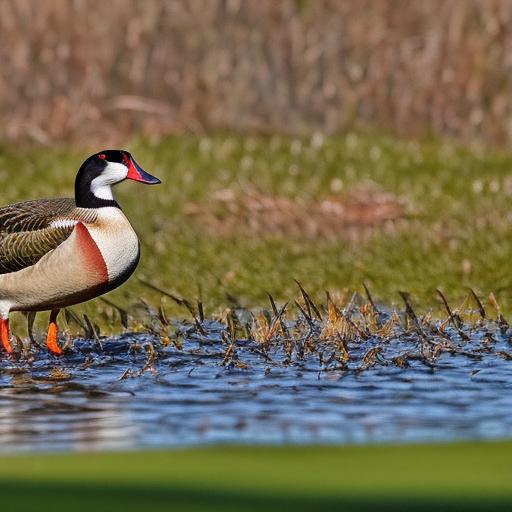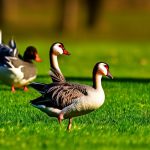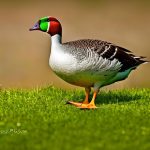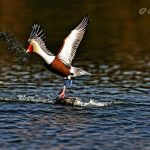Canadian geese are a common sight in many parts of North America, including Canada and the United States. These large waterfowl are known for their distinctive honking calls and V-shaped flight formations. While they may be beautiful to observe in the wild, they can become a nuisance when they invade yards and cause damage. In this article, we will explore the behavior of Canadian geese and discuss various methods to prevent them from invading your yard.
Key Takeaways
- Canadian geese are social birds that mate for life and are highly protective of their young.
- Geese are attracted to yards with open spaces, water sources, and easy access to food.
- Physical barriers such as fences, netting, and hedges can prevent geese from entering your yard.
- Decoys, noise makers, and other scare tactics can be effective in deterring geese from your property.
- Creating an uninviting environment by removing food sources and nesting areas can discourage geese from nesting in your yard.
Understanding the behavior of Canadian geese
Canadian geese are migratory birds, meaning they travel long distances between their breeding grounds and wintering areas. They typically breed in northern regions and migrate south for the winter. During their migration, they form large flocks and fly in a V-shaped formation to conserve energy. Understanding their migratory patterns can help us predict when they are likely to be in our area.
When it comes to nesting and feeding habits, Canadian geese prefer open areas near water bodies such as lakes, ponds, and rivers. They build their nests on the ground, usually near water, and lay an average of 5-6 eggs per clutch. The female incubates the eggs while the male stands guard nearby. Once the eggs hatch, both parents take care of the goslings.
Canadian geese are also known for their territorial behavior. They will defend their nesting and feeding sites aggressively against other geese or perceived threats. This territorial behavior is one reason why they may invade yards, as they see them as potential nesting or feeding sites.
Identifying the reasons why geese are attracted to your yard
There are several factors that can make your yard attractive to Canadian geese. These include the presence of open grassy areas, proximity to water sources, lack of natural predators, and availability of food sources such as grass and grains. Geese are also attracted to yards that provide shelter from wind and predators.
When choosing their nesting and feeding sites, geese look for areas that offer good visibility, easy access to water, and ample food supply. They prefer areas with short grass, as it allows them to spot potential predators more easily. If your yard meets these criteria, it is more likely to attract geese.
Implementing physical barriers to keep geese out
One effective way to prevent geese from invading your yard is by installing physical barriers. There are several types of barriers that can be used, including fences, netting, and floating barriers. Fences should be at least 3-4 feet high and have a top that slopes outward to prevent geese from perching on it. Netting can be used to cover ponds or other water features to prevent geese from accessing them. Floating barriers can be placed in water bodies to create a physical barrier that prevents geese from reaching your yard.
When installing physical barriers, it is important to ensure they are properly maintained. Regularly check for any damage or gaps in fences or netting and repair them promptly. Remove any debris or vegetation that may accumulate on floating barriers, as this can provide a foothold for geese.
Using decoys and scare tactics to deter geese
Another method to deter geese from invading your yard is by using decoys and scare tactics. Decoys are life-sized replicas of predators such as coyotes or owls that can be placed in your yard to create the illusion of danger. Geese are naturally wary of predators and will avoid areas where they perceive a threat.
Scare tactics can also be effective in deterring geese. These include using noise-making devices such as air horns or banging pots and pans together, as well as using visual deterrents such as reflective tape or scare balloons. The key is to regularly change the location and type of scare tactics used, as geese can become habituated to them over time.
Creating an uninviting environment for geese to nest and feed
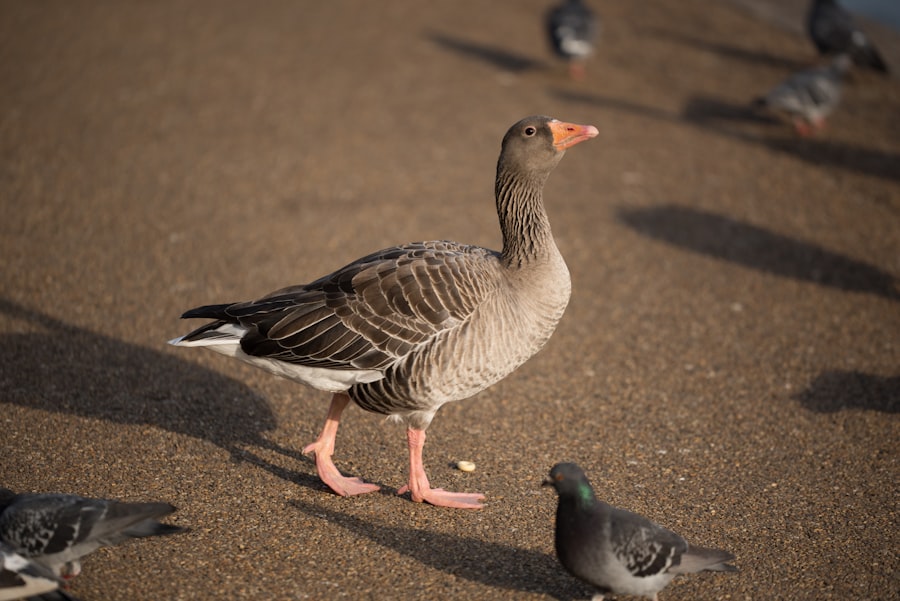
Making your yard unattractive to geese is another way to prevent them from invading. One method is to regularly mow your lawn to keep the grass short. Geese prefer areas with tall grass, as it provides cover from predators. By keeping your lawn well-maintained, you can discourage geese from nesting in your yard.
You can also make your yard uninviting by removing any standing water or puddles, as geese are attracted to water sources. Fix any leaky faucets or sprinklers that may create puddles. Additionally, remove any food sources such as spilled birdseed or fallen fruit, as these can attract geese.
Maintaining a clean yard to discourage geese from visiting
Keeping your yard clean and free of debris can also discourage geese from visiting. Geese are attracted to areas with ample food supply, so by regularly cleaning up fallen leaves, grass clippings, and other organic matter, you can reduce the availability of food for geese.
It is also important to properly dispose of garbage and secure trash cans to prevent geese from accessing them. Geese are opportunistic feeders and will take advantage of any available food source.
Planting specific vegetation to repel geese
Certain types of vegetation can repel geese and make your yard less attractive to them. These include plants with prickly or thorny leaves, such as holly bushes or rose bushes. Geese are less likely to land or walk on these types of plants due to the discomfort they cause.
You can also plant tall grasses or shrubs near water bodies to create a physical barrier that prevents geese from accessing your yard. These plants provide cover for other wildlife while making it difficult for geese to navigate through.
Installing sound and light devices to repel geese
Sound and light devices can be effective in deterring geese from invading your yard. These devices emit loud noises or flashing lights that startle and scare geese away. There are various types of sound and light devices available, including motion-activated ones that only activate when geese are present.
When installing sound and light devices, it is important to consider the proximity to neighboring properties. Ensure that the devices are not causing a disturbance to others while still effectively deterring geese.
Seeking professional help for geese removal
In some cases, professional help may be necessary to remove geese from your yard. This is especially true if you have a large population of geese or if they have become aggressive or destructive. Professional wildlife control companies have the expertise and resources to safely and effectively remove geese from your property.
When seeking professional help, it is important to choose a reputable company that uses humane methods of geese removal. Avoid companies that use lethal methods or harm the geese in any way.
Adopting humane methods to control geese population
It is important to use humane methods when controlling the geese population. This includes implementing deterrents and barriers that do not harm the geese or their offspring. By using humane methods, we can coexist with wildlife while minimizing conflicts.
Humane methods of controlling the geese population include egg addling, which involves shaking or coating eggs with oil to prevent them from hatching, and habitat modification, which involves altering the environment to make it less suitable for nesting and feeding.
In conclusion, preventing Canadian geese from invading your yard requires a combination of methods that target their behavior and preferences. By understanding their migratory patterns, nesting and feeding habits, and territorial behavior, we can implement physical barriers, decoys, scare tactics, and other deterrents to keep them out. Creating an uninviting environment, maintaining a clean yard, planting specific vegetation, and using sound and light devices can also help repel geese. If necessary, seeking professional help for geese removal is an option, but it is important to choose a company that uses humane methods. By taking action to prevent geese from invading our yards, we can minimize damage and conflicts while still appreciating these beautiful birds in their natural habitats.
If you’re looking for ways to keep Canadian geese out of your yard, you might also be interested in learning about the ideal chicken coop door size. Poultry Wizard has a helpful article on their website that discusses the importance of choosing the right door size for your chicken coop. By understanding the optimal dimensions, you can ensure that your coop remains secure and protected from unwanted visitors like geese. Check out the article here: https://poultrywizard.com/keeping-chickens/chicken-coop-door-size/.
FAQs
What are Canadian geese?
Canadian geese are a species of waterfowl that are native to North America. They are known for their distinctive black heads and necks, white cheeks, and brown bodies.
Why do Canadian geese come into my yard?
Canadian geese are attracted to yards that have open spaces, water sources, and plenty of grass to graze on. They may also be attracted to yards that have bird feeders or other sources of food.
Are Canadian geese dangerous?
Canadian geese are generally not dangerous to humans, but they can become aggressive if they feel threatened or if they are protecting their young. They may also carry diseases that can be transmitted to humans.
How can I keep Canadian geese out of my yard?
There are several methods that can be used to keep Canadian geese out of your yard, including installing fencing or netting, using scare tactics like noise makers or decoys, and removing sources of food and water.
Is it legal to harm or kill Canadian geese?
No, it is illegal to harm or kill Canadian geese without a permit from the government. Canadian geese are protected under the Migratory Bird Treaty Act, which prohibits the hunting, killing, or possession of migratory birds without a permit.
Meet Walter, the feathered-friend fanatic of Florida! Nestled in the sunshine state, Walter struts through life with his feathered companions, clucking his way to happiness. With a coop that’s fancier than a five-star hotel, he’s the Don Juan of the chicken world. When he’s not teaching his hens to do the cha-cha, you’ll find him in a heated debate with his prized rooster, Sir Clucks-a-Lot. Walter’s poultry passion is no yolk; he’s the sunny-side-up guy you never knew you needed in your flock of friends!

